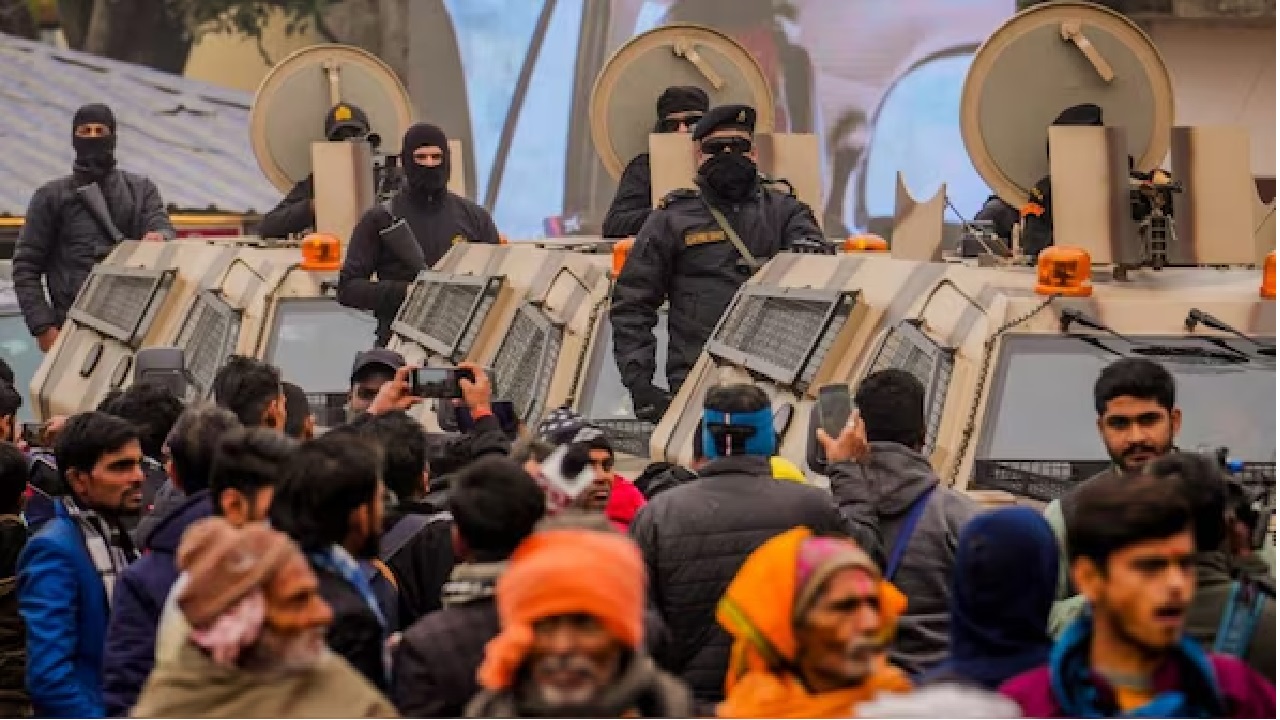
Threat to Ayodhya’s Sacred Temple
In response to a recent video threat from Gurpatwant Singh Pannun, leader of the banned Khalistani group Sikhs for Justice (SFJ), security has been intensified in the historic and religiously significant city of Ayodhya. Pannun, known for his pro-Khalistan separatist advocacy, reportedly recorded a message in Brampton, Canada, warning of violent actions targeting Ayodhya’s Ram Mandir and other Hindu temples on November 16-17. The threat coincides with the sacred ‘Ram Vivah’ festival, an important religious event attended by thousands, including Uttar Pradesh Chief Minister Yogi Adityanath.
This warning represents a significant escalation from Pannun, who has previously made inflammatory statements. His rhetoric, referencing Ayodhya as the “birthplace of violent Hindutva ideology,” has heightened concerns, particularly as this is one of India’s most revered sites, inaugurated by Prime Minister Narendra Modi in January. Law enforcement has taken decisive steps to bolster Ayodhya’s security, preparing for any eventuality.
Heightened Security Measures in Ayodhya
In response to Pannun’s threat, Ayodhya’s security apparatus has been substantially reinforced. Ayodhya range Inspector General of Police Praveen Kumar emphasized the city’s fortified state, noting that police and paramilitary forces are already stationed for round-the-clock vigilance. This response includes increased surveillance in and around the Ram Janmabhoomi complex, where the Ram Mandir is located, with expanded use of CCTV and drone monitoring systems to cover key areas.
Police have also escalated security protocols for the ongoing Kartik Parikrama Mela, a pilgrimage event that draws significant crowds. Security checkpoints, enhanced police presence, and round-the-clock monitoring have been instituted across Ayodhya to ensure both public safety and the safeguarding of religious sites. According to senior law enforcement officials, prior threats of violence in Ayodhya by extremist groups have been averted, demonstrating the police’s preparedness to counter similar threats.
Assessing the Threat: Pannun and SFJ’s Anti-India Campaign
Pannun, designated as a terrorist under India’s Unlawful Activities Prevention Act (UAPA) in 2020, has long propagated the Khalistani separatist agenda, using social media and international channels to target India’s government. Recently, he has also threatened Indian diplomatic activities abroad, warning Indo-Canadians to distance themselves from Indian government events. Pannun’s rhetoric underscores SFJ’s attempt to project influence through intimidation, urging supporters to disrupt public life and spread fear among the Indian diaspora.
The authorities are taking a measured approach, with police assessing the authenticity of Pannun’s latest video while preparing for any credible threats. Given SFJ’s history of leveraging media and online platforms to spread propaganda, law enforcement is cautiously evaluating the situation. Nevertheless, officials stress that India’s capacity to counteract such threats has significantly evolved, with heightened readiness in sensitive areas.
Local Response and Ayodhya’s Defiant Spirit
Ayodhya’s response to the threat reflects a strong stance of resilience and faith. Girish Pati Tripathi, Ayodhya’s mayor, dismissed the threat, stating, “No one can dare to launch an attack in Ayodhya, which is protected by Lord Hanuman.” His statement captures the local sentiment—a mixture of devotion and confidence in the security infrastructure, reinforced by highly trained personnel assigned to protect the city.
Senior Superintendent of Police (SSP) RK Nayyar assured the public that the latest security measures are part of ongoing efforts to counter any terrorist actions in Ayodhya. The administration remains committed to ensuring that religious activities continue peacefully, maintaining normalcy for residents and devotees alike.
A United Stand Against Threats to Religious Harmony
As Ayodhya prepares for the ‘Ram Vivah’ festival amidst a climate of heightened security, the Indian government’s response serves as a reminder of the resilience and vigilance that defines the nation’s approach to protecting its sacred heritage. Pannun’s threats, while concerning, underscore the enduring need for robust security strategies in safeguarding India’s religious sites from extremist agendas. Ayodhya’s fortified status, combined with the firm response from law enforcement and local leaders, reflects a broader resolve to counter external threats and uphold the nation’s cultural and religious harmony.
India’s agencies, working together with local authorities and religious leaders, remain committed to thwarting disruptive forces, ensuring that places of worship and faith remain protected sanctuaries. As Ayodhya stands fortified, its spirit of unity and resilience sends a powerful message: threats against harmony and devotion will be met with strength and unwavering resolve.
(With inputs from agencies)







